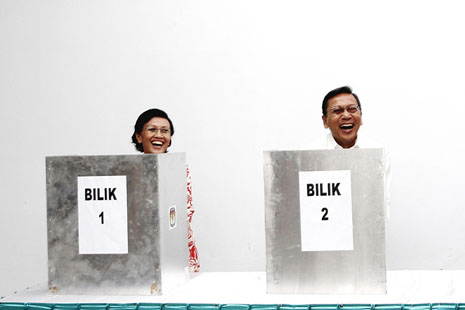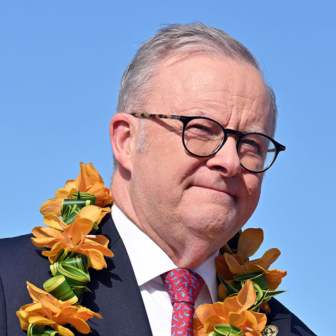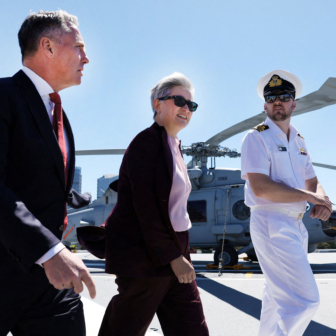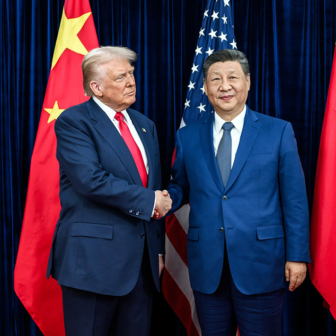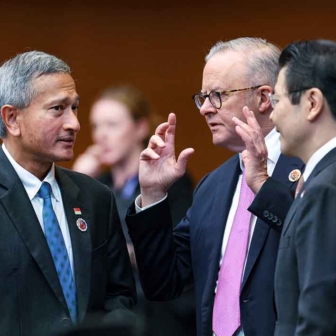INTERNATIONAL REPORTING of Indonesia, including in the Australian media, has tended to oscillate excessively from the euphoric to the gloomy. The recent Jakarta bombings, the first in Indonesia in almost four years, are certainly a terrible tragedy. But the country is in good hands, and its economy is doing better than most at the moment. And the election of Dr Boediono as vice president in this month’s election is further good news for the country, its neighbourhood and Australia.
One of the most durable and important elements in the Australia–Indonesia relationship is the large number of Indonesians who have studied in our universities. Among recipients of Australian graduate-level scholarships, Indonesians are the largest group, and Australia also hosts the largest number of private Indonesian university students studying abroad.
More so than alumni from almost any other country in Southeast Asia, these graduates increasingly occupy senior positions in government, business, universities and civil society. It is no exaggeration to say that this is probably the single most important dynamic in the bilateral relationship. At elite levels in Indonesia, we are probably now better understood than any other western nation. And the fact that many earlier Australian graduates send their children here to study adds further momentum.
In the outgoing Yudhoyono administration three cabinet ministers were graduates of Australian universities; in the recently elected administration, which assumes power in October, vice president-elect Boediono has close Australian connections. For more than a decade, he has been the most important economic policy-maker in Southeast Asia’s dominant power.
Boediono (who, like many Javanese, has only one name) is a courteous, understated, cautious, reserved individual. He is not a crusading, charismatic figure, and is quite different in style and substance from the current vice president, Jusuf Kalla, a controversial, “can do” politician. But Boediono can be tough and resolute, as he has shown in handling several demanding portfolios and dealing with policy challenges way greater than his Australian counterparts ever have to contemplate.
He has had a stellar academic, ministerial and now political career. Born in 1943, he spent extended periods at three Australian universities, initially courtesy of a Colombo Plan scholarship. He graduated with an economics degree from the University of Western Australia in 1967, followed by a Masters degree from Monash in 1972. He also spent two years in the early 1970s as a junior researcher at the Australian National University, the university with which he has continued to have a close intellectual association (and from which his daughter also subsequently graduated). He later earned a PhD from the Wharton School at the University of Pennsylvania.
Most of Boediono’s academic career has been at Gadjah Mada University, Yogyakarta. Even as a government minister he has maintained Yogyakarta as his principal place of residence, and often conducts Saturday classes at the university.
From the mid 1980s Boediono was increasingly pulled into the Jakarta policy world. Appointed to the senior staff of the National Planning Agency, Bappenas, he rose quickly through the ranks, becoming a deputy (or sub-minister) in the late 1980s. He was one of the directors of the Bank Indonesia, the central bank, over the period 1993–98. Boediono’s ministerial career formally commenced in May 1998, when the incoming president, B.J. Habibie, appointed him as planning minister (and head of Bappenas), a position he held throughout the seventeen-month administration. He was technically out of government during the controversial Wahid presidency, but returned as finance minister under Megawati from August 2001 to November 2004. After another short break, he returned to cabinet as President Yudhoyono’s coordinating economics minister in December 2005, a position he held until June 2008. At the behest of the president, he was then appointed to the position of governor of Bank Indonesia in May 2008, overcoming an impasse that had arisen from the parliament’s refusal to agree to any of the other candidates nominated by the administration.
This short summary of Boediono’s ministerial career highlights two key achievements. One is that over the past decade he has held every major economic policy-making position in the Indonesian government. It is difficult to think of a policy-maker in any other major country with comparable experience. The other is that he has been at the centre of decision-making when Indonesia faced momentous challenges. At least three deserve mention. The first was the Asian financial crisis in 1997–98, during which the Indonesian economy contracted severely, both the currency and the banking system collapsed, and relations with the donor community soured. Second, as finance minister in the early years of this decade he presided over a remarkable recovery in state finances, rapidly bringing down public debt and managing to control the spending propensities of a divided cabinet not known for its economic literacy. He also adroitly navigated the country’s exit from the detested IMF program. And, third, he was in charge of the nation’s central bank as the current global financial crisis hit; thus far the country has navigated its way through the crisis competently.
One other feature of Boediono’s ministerial career deserves comment: at a time of unprecedented political turmoil and intrigue, he has managed to remain above the fray. At one stage, Indonesia had had five presidents in six years, and Boediono was a senior figure under four of them. The governorship of the central bank in particular has been a political minefield. In spite of its independence – which was a condition of the IMF rescue package – all occupants of that position, except for Boediono, have subsequently faced extended legal action, house arrest or imprisonment. The closest Boediono came to political controversy was as a result of the so-called BLBI scandal at the height of the financial crisis in 1997–98, when the central bank spent billions of dollars in an effort to rescue the ailing banking system. This led to the dismissal of the bank’s governor, and his subsequent long-running trial. For a period, it appeared that Boediono might also be charged, but he has since been officially cleared.
BOEDIONO turned sixty-five last year. It was widely expected that he would complete his distinguished career of government service by serving out the five-year term as head of the central bank, and then return to academe. But following this year’s April parliamentary elections, at which Yudhoyono’s party was the clear, but minority, victor, attention turned to the choice of running mate for the 8 July presidential elections. The initial assumption was that Yudhoyono (universally known as SBY) would choose a leader from one of the other political parties. Quite suddenly, however, rumours surfaced that Boediono might become his vice-presidential candidate, and in mid-May this became official.
Two reasons appear to explain his selection. One was SBY’s greatly enhanced power following success at the parliamentary elections, and hence his freedom to appoint a vice-president of his choosing. As a corollary, since this is his final term, vice presidential loyalty was considered to be essential, and a “non politician” was therefore preferred. An occasional irritation during SBY’s current term has been the sometimes erratic behaviour of his outgoing deputy, Jusuf Kalla. The second factor was the difficulty of choosing an acceptable candidate from among the four Moslem parties with which SBY had teamed up.
The parallels with Indonesia’s earlier pre-eminent economic policy-maker, Professor Widjojo Nitisastro, are striking, even though the authoritarian and democratic eras are so very different. Both Boediono and Widjojo were hand-picked by two Javanese presidents, SBY and Soeharto, military men by career, and with an instinctive recognition of the importance of good economic management. Both presidents developed a very close rapport and personal chemistry with their principal economic advisers, both also Javanese, quintessential technocrats of great intellect and integrity, and with an evident capacity to read their leader’s mind and mood. Soeharto in fact wanted Widjojo as his vice-president in 1983, but personal circumstances got in the way.
It is not clear how Boediono’s candidature affected the outcome of this month’s presidential elections. The campaign was mainly personality-based. It lacked fire, controversy and grand policy or ideological debates. The three presidential candidates dominated the media. The other two vice-presidential candidates were controversial and divisive military figures who still remain subject to US travel restrictions.
Boediono is not a natural politician, but he adapted to political life more quickly than expected and ran an effective campaign. As expected, he was especially comfortable dealing with economic policy issues, which surveys showed to be the dominant concern of the electorate. Along with his impeccable personal credentials, this was undoubtedly an asset for SBY. Nor did it go unnoticed that his personal wealth was the lowest of the six presidential and vice-presidential candidates.
Perhaps the most contentious poll issue was the pejorative “neo-lib” label that a desperate and populist opposition tried to pin on Boediono. This was a scurrilous attack on his record in government, alleging that he is too close to the IMF and foreign investors and that he neglects issues of social justice. These strident “nationalist” assertions are of course wildly misleading.
APART FROM a series of widely used textbooks, Boediono’s academic publications are not extensive. His major outlet has been the Australian National University’s Bulletin of Indonesian Economic Studies, or BIES, with which he has been closely associated as a board member since 1984. He has continued to write when out of government. By far the most important recent paper is his “Managing the Indonesian Economy: Some Lessons from the Past,” presented at ANU’s annual Indonesia Update conference in 2005 and published in BIES. This essay provides the best English-language summary of his views on economic policy-making in Indonesia. His survey of post-independence economic policy-making emphasises the need for economic policy cohesion (present under Soeharto, absent for much of the next few years), a coherent and credible economic strategy, and macroeconomic stability.
Boediono regards the central challenges as building institutions to underpin a fragile democracy. These include, crucially, the judiciary and law enforcement, on which he notes slow progress to date, and the civil service, reform of which was neglected in the early post-Soeharto era. In the article he warns of the possible “disharmony between politics and economics” and argues that some economic policy-making should be insulated from the pressures of vested interests. Examples include central bank independence and legislated fiscal policy constraints – both achieved in Indonesia in recent years, with Boediono playing a central role in the process.
Boediono is a technocrat and, although he is popularly elected, he does not have an independent political base. Nor does he have further political aspirations; in fact, he did not seek this high office. He is therefore likely to be more of a prime minister, a cabinet coordinator, especially on economic policy, and a manager of the often unpredictable and assertive parliament. He will therefore free SBY for broader national and issues.
The most important consideration for Australia is that for the next five years Boediono will be a central player in the major power of our neighbourhood. Nothing matters more to Australian foreign policy than a stable and prosperous Indonesia at peace with itself and its neighbourhood. This will be an administration whose cabinet is far more “Australia-literate” than can be said of the converse. (Regrettably, we have never had an Australian minister deeply immersed in Indonesia.) That means an administration well disposed towards us.
In the case of Boediono, it also means we have a natural partner for a range of initiatives including, importantly, G20-based reforms of the economic and financial architecture, and further institution-building in the Asia–Pacific region. His elevation will also enhance the effectiveness of our development assistance program to Indonesia, which, approaching $500 million annually, is our largest country program, and the second largest bilateral program to Indonesia.
Conversely, it is important not to have unrealistic expectations. Inevitably, there will be differences in a bilateral relationship between two neighbours who are so different in so many respects. Particular individuals can do only so much. In the final analysis, it is the broad layers of social, cultural, commercial and personal relations that are the arbiters of whether there is a close and durable friendship between two nations. •
